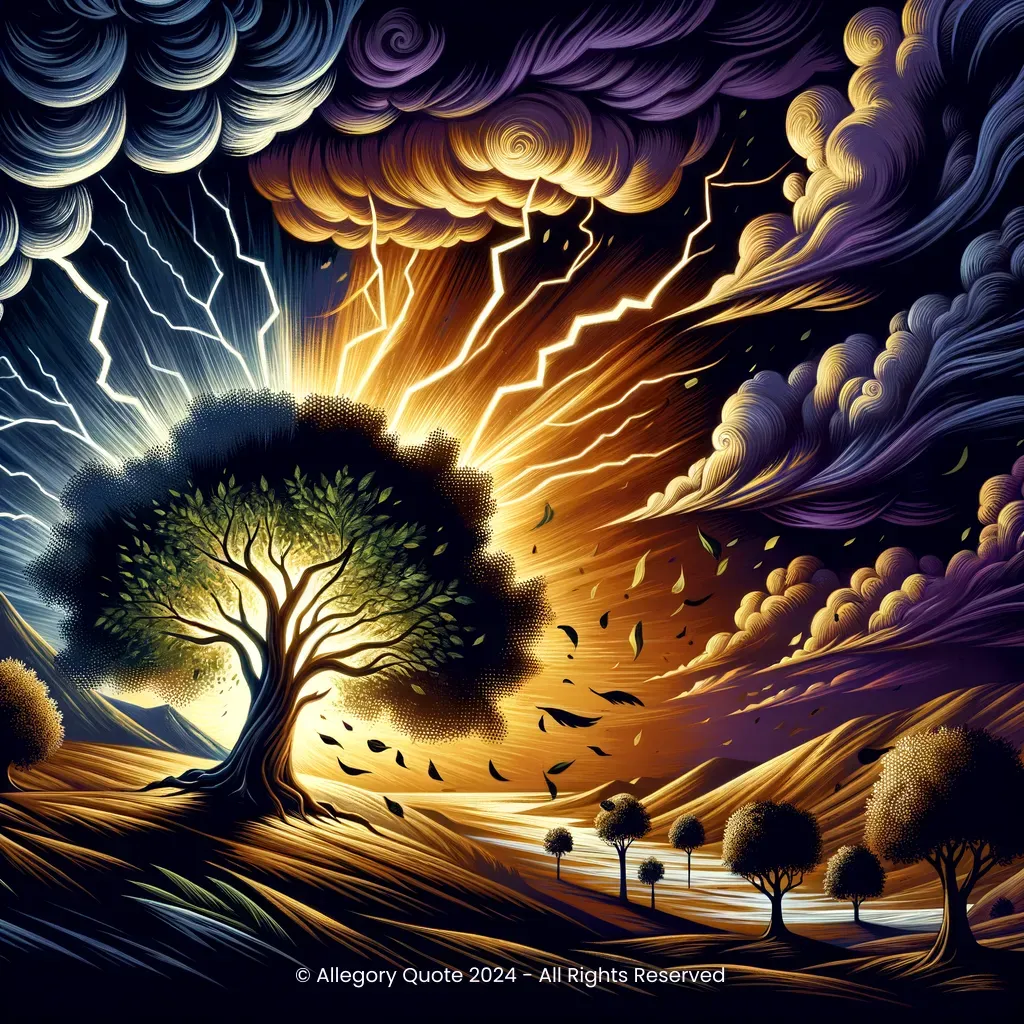”Great spirits have always encountered
violent opposition from mediocre minds“

0
0
0
0
- Meaning
- The phrase suggests that individuals with exceptional intellect or creativity often face significant resistance from those who do not comprehend or appreciate their ideas. This can be interpreted through a philosophical lens as a commentary on the nature of progress and innovation: the innovative often disrupts established norms, which can elicit defensive or hostile reactions from those who prefer the safety of convention. From a psychological perspective, this reflects the idea that fear of the unknown can lead to hostility toward those who challenge the status quo.
- Allegory
- The image features a majestic, brightly colored tree standing resolutely amidst a turbulent storm, symbolizing great spirits who bravely confront the opposition. Surrounding the tree are dark clouds and swirling winds, which represent the violent challenges faced by innovators. The contrasting colors highlight the vibrancy of creativity and the struggle against mediocrity, visually encapsulating the essence of Einstein's thought on resilience and the nature of greatness.
- Applicability
- This phrase can encourage individuals to embrace their unique ideas and perspectives, reminding them that resistance from others can be a sign of their worthiness. It encourages resilience and highlights the importance of perseverance in the face of doubt or criticism. In daily life, this can be applied by promoting open-mindedness and fostering environments where new ideas can flourish without fear of rejection.
- Impact
- This phrase has impacted discourse on creativity, innovation, and the struggle for acceptance of groundbreaking ideas. It is often quoted to inspire inventors, artists, and thinkers to remain steadfast in their convictions despite opposition. It resonates in discussions about artistic expression, scientific inquiry, and social reform, highlighting the often rocky path of great visionaries.
- Historical Context
- The origin of this phrase can be traced back to the early 20th century, when Einstein was formulating his theories and surely faced considerable scrutiny and opposition from traditional scientists. The phrase reflects the zeitgeist of a period marked by substantial scientific and societal upheaval.
- Criticisms
- Critics may argue that the phrase oversimplifies the dynamics of creativity and innovation by framing dissenters as 'mediocre minds' and implying that all opposition is unfounded. This can lead to a dismissive view of constructive criticism, which is essential for growth and refinement. An argument against the phrase's interpretation is that not all opposition arises from mediocrity; sometimes, differing opinions stem from valid concerns or alternative perspectives.
- Variations
- Variations of this phrase appear in different cultures, where the resistance to new ideas is reflected in proverbs and sayings. For example, in Chinese culture, there is a saying that roughly translates to 'A nail that sticks out gets hammered down,' which conveys a similar sentiment about the challenges faced by individuals who stand out due to their unique ideas or contributions.
-

Once we accept our limits, we go beyond them.
-

You never fail until you stop trying.
-

It is the supreme art of the teacher to awaken joy in creative expression and knowledge.
-

The true sign of intelligence is not knowledge but imagination.
-

Only a life lived for others is a life worthwhile.
-

Weakness of attitude becomes weakness of character.
-

Education is what remains after one has forgotten what one has learned in school.
-

Strive not to be a success, but rather to be of value.
-

If you can't explain it simply, you don't understand it well enough.
-

Insanity is doing the same thing over and over again and expecting different results.
No Comments